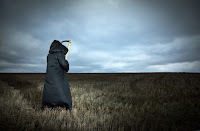 "The Kingdom of This World" by Alejo Carpentier, has to be the strangest novel that I have ever read during my collegiate career here at Brigham Young University. I appreciated how quick of a read the book was, but was a bit thrown of by the sensual content and "real, in-your-face" subject matter. What was both difficult and interesting for me, as the reader, were the feelings that Carpentier evoked inside of me in regards to slaves and their own acts of immoral rebellion. Never before had I attempted to look at the world from a slave's perspective. A world filled with sorrow, anguish, temptation, sorcery, and the ever allusive appeal of freedom. What most drew me in and what will serve as the basis of this blog post was Ti Noel's ability to, near the end of the novel, relate better with his prior slave owners and view the masses as they most certainly did.
"The Kingdom of This World" by Alejo Carpentier, has to be the strangest novel that I have ever read during my collegiate career here at Brigham Young University. I appreciated how quick of a read the book was, but was a bit thrown of by the sensual content and "real, in-your-face" subject matter. What was both difficult and interesting for me, as the reader, were the feelings that Carpentier evoked inside of me in regards to slaves and their own acts of immoral rebellion. Never before had I attempted to look at the world from a slave's perspective. A world filled with sorrow, anguish, temptation, sorcery, and the ever allusive appeal of freedom. What most drew me in and what will serve as the basis of this blog post was Ti Noel's ability to, near the end of the novel, relate better with his prior slave owners and view the masses as they most certainly did. After having mastered the ability to transform into animals, just as his hero Macandal had done, Ti Noel makes a realization with what appears to, in my opinion, yield a double meaning. The narrator explains:
"Once he had come to this decision, Ti Noel was astonished a thow easity it is to turn into an animal when one has the necessary powers."
(Alejo Carpentier, The Kingdom of This World, 172)
Further on, after having experimented with numerous transformations, Noel finds himself living for a brief period amongst a group of geese. Upon attempting to establish himself as a goose like unto the rest of the geese, "he encountered (nothing but) sawtoothed beaks and outstretched necks that kept him at a distance." Knowing for himself that he was, in fact, their superior as a wildlife transformer, the narrator describes Noel's thoughts and feelings stating that:
"Thus Ti Noel quickly gathered that even if he persisted in his efforts for years, he would never be admitted in any capacity to the rites and duties of the clas. It had been made crystal clear to him that being a goose did not imply that all geese were equal."
(Alejo Carpentier, The Kingdom of This World, 177)
The first time that I read the quote found on page 172, I interpreted it just as I suppose that most people do the first time they read it. Literally, it was easier to transform into any animal after having found the necessary powers. Upon further interpretation, I felt differently, however. As Ti Noel, increased in power and dominion over those that surrounded him (his ability to transform into animals whenever desired), he became more "animal-like." He became more primitive, domineering, and inclined to seek that which benefitted him over the needs of the group.
 Noel's brief experience as a goose solidifies the previoulsy mentioned opinion in that, just as his previous masters had felt, being like the masses does not necessarily denote natural equality among the group. In Noel's own life, Dominicans, Haitians, slaves, and slave owners alike were all human beings, yet, with the societies social parameters soundly established, suddenly Dominicans were of a higher status than Haitians and slaves at the bottom of all social castes. Perhaps, Noel, at the end of his life in the ACTUAL Kingdom of This World found his ultimate happiness in a higher level of understanding. Understanding of mother nature, society and it's institutions, and man as a whole.
Noel's brief experience as a goose solidifies the previoulsy mentioned opinion in that, just as his previous masters had felt, being like the masses does not necessarily denote natural equality among the group. In Noel's own life, Dominicans, Haitians, slaves, and slave owners alike were all human beings, yet, with the societies social parameters soundly established, suddenly Dominicans were of a higher status than Haitians and slaves at the bottom of all social castes. Perhaps, Noel, at the end of his life in the ACTUAL Kingdom of This World found his ultimate happiness in a higher level of understanding. Understanding of mother nature, society and it's institutions, and man as a whole.
**** Philip Zimbardo's Stanford Prison Experiment ****
"Heroes are those who can somehow resist the power of the situation and act
out of noble motives, or behave in ways that do not demean others when they
easily can."
- Philip Zimbardo













